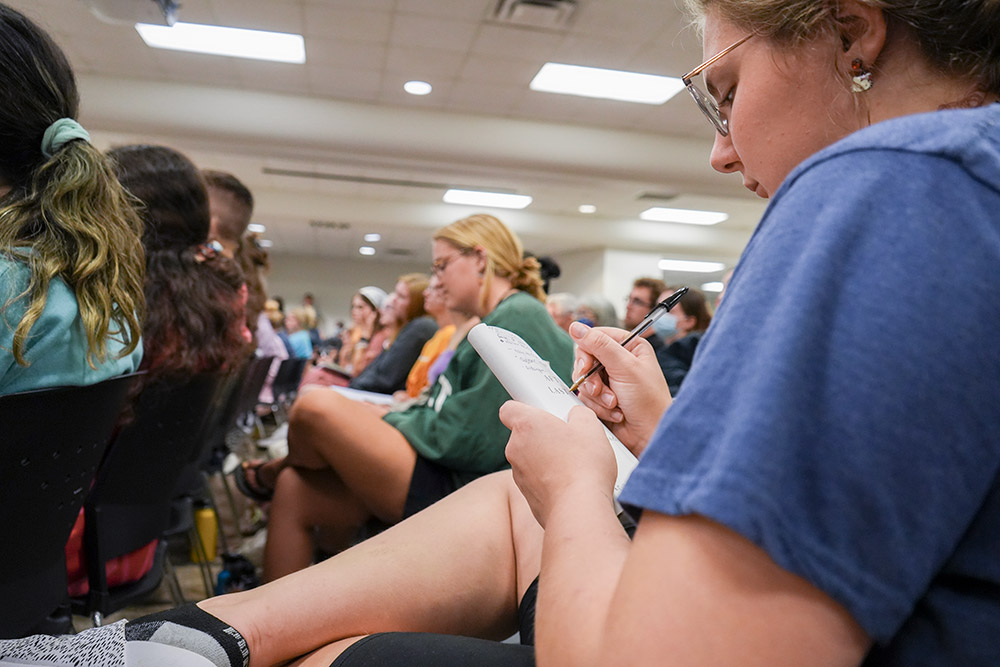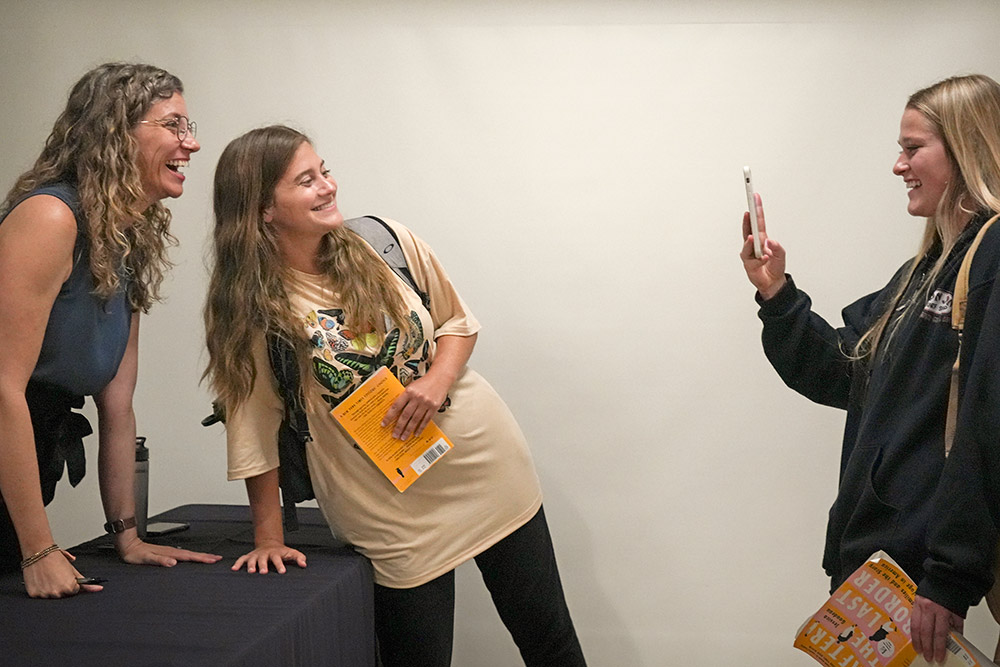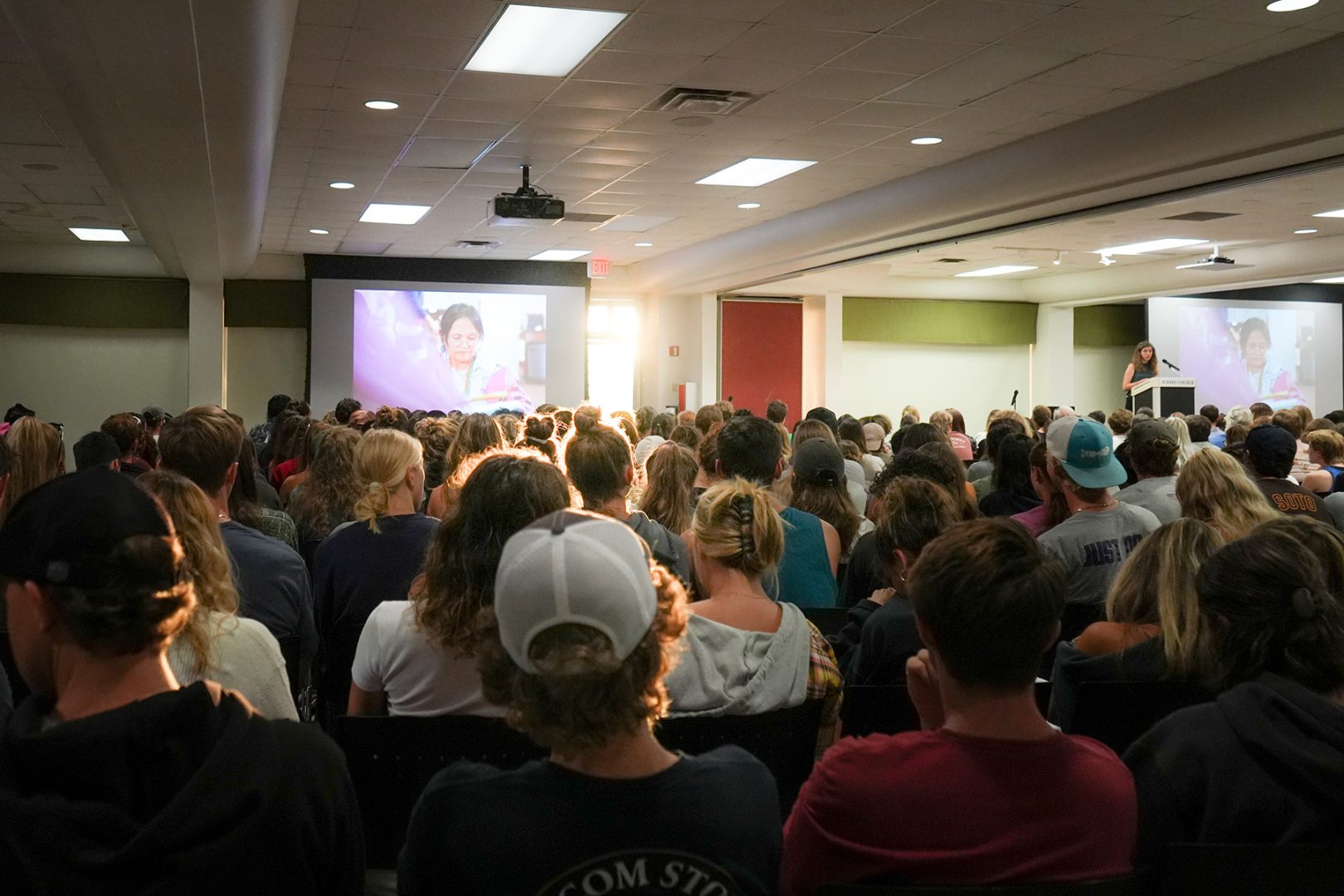Jessica Goudeau, Ph.D., panned the cellphone camera from left to right across Fox Hall as cheers erupted from the more than 400 people attending her Sept. 14 evening lecture at Eckerd College—one of her first in-person events since publishing After the Last Border: Two Families and the Story of Refuge in America (Penguin Books, 2020).
“I just want to get a video for Mu Naw and Hasna to see how many people came out tonight,” author Goudeau said, marveling at the size of the audience. She was careful to use the pseudonyms of the two women central to her book and emphasize her relationship to them as an author, a friend and a witness.

A student takes notes in a copy of Goudeau’s book. Photo: Zach Franco ’23
Much of Goudeau’s talk, sponsored by the Eckerd College (formerly Florida Presbyterian College) Class of 1968, centered on the idea of decentralizing oneself in the work of documenting the stories of the refugee crisis and any other issue fraught with trauma for the subject. She reached into her educational background as a literature-scholar-turned-journalist to make connections for the anticipating audience. On-screen, she displayed Swiss-German artist Paul Klee’s 1920 “Angelus Novus” to tell the story of its owner, Walter Benjamin, a German-Jewish philosopher who named the piece the “Angel of History” before he died in lieu of being caught fleeing France by the Nazi regime. The frozen image of a wary winged creature illustrated Goudeau’s thesis—pulled from Benjamin’s own “Thesis IX”—”One of the most sacred tasks of human beings is not to fix, but to witness,” she said.
Goudeau’s first opportunities to witness came as a graduate student in Austin, Texas, when Hurricane Katrina decimated New Orleans and other gulf coast towns. Watching that loss as a Red Cross volunteer prepared her for meeting Mu Naw, a Christian from Myanmar who resettled in Texas after years in a refugee camp. Goudeau eventually built a friendship and a nonprofit with Mu Naw and other Myanmar refugee women, only to strain that trust by taking pictures of herself handing those women checks for the successful sale of their crafts for income.
“The move to really see the people began in me first on a cold November night with a camera in hand and checks,” Goudeau said. “That was the start of the journey to realizing the goal was not to fix. I cannot make whole what has been smashed. I can, however, witness.”
She never published the photos, and she vowed to use only pseudonyms to protect the refugees whose stories she began to tell in news publications as the refugee rhetoric in the U.S. shifted from welcoming to scandalizing.
Zach Franco, a senior anthropology and Spanish student from Lighthouse Point, Florida, who also works for Eckerd’s student newspaper, The Current, asked Goudeau how she interviews her subjects about the traumatic experiences of war and resettlement without further traumatizing them.
“I go into interviews with lots of caveats about publication; maybe less than 10% of my interviews are for publication,” she explained. “I tell people I am not a therapist and let them lead. I ask, ‘What do you want to tell me?’ And we go from there.”
On top of writing tips, interviewing tips and tidbits about her life as a Spanish-fluent international traveler, Goudeau shared the names of some of her favorite authors and artists for the crowd to explore on its own.

Goudeau took time out to meet, chat with and sign books for Eckerd students. Photo: Zach Franco ’23
Eckerd students, faculty, staff and other community members were engaged from beginning to end, for many had read After the Last Border as the Summer Reading Series book for incoming first-year students and rising seniors. Goudeau’s lecture was the inaugural event of this year’s theme: Courage and Belonging.
Goudeau’s busy day on Eckerd’s campus began with a lecture for all first-year students taking the Human Experience course followed by a brunch with sponsors from the Class of 1968. She returned in the evening for a reception with interim President Jim Annarelli, more members of the Class of 1968, honor students and distinguished guests. After her 7 p.m. public lecture in Fox Hall, Goudeau signed copies of her book for throngs of students and fans.
Annarelli had introduced Goudeau before her presentation, praising her vocation. “Her life’s work,” he said, “is a model of service and citizenship for us all.”













